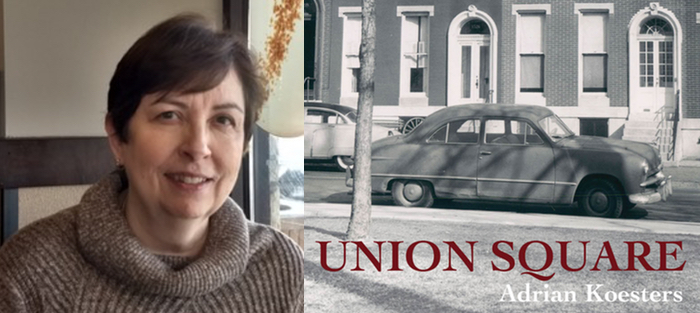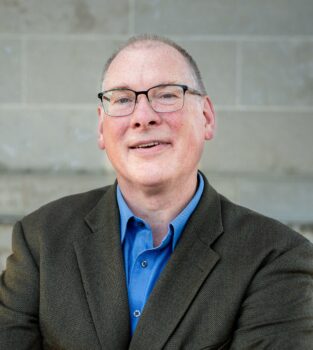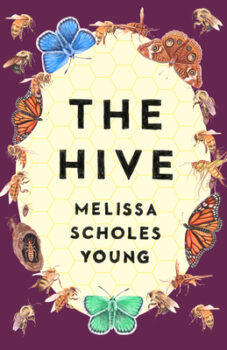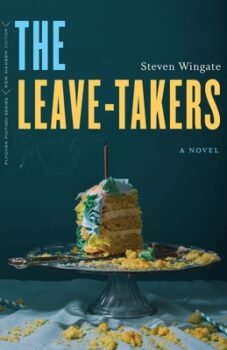Some books leap out at you right away and let you know just what kind of ride you’re about to go on. Other books put their hand over yours, the precision of their language reassuring you that the author knows where you’re going together, and gradually tighten their grip around your wrist until you’re not sure you can break out of it. Union Square, by Adrian Koesters, published this week by Apprentice House Press, is the latter kind of experience. It is a slow burn of a novel that weaves patches of isolated urban lives into a heartbreaking loss of innocence that lights up like a bonfire.
Union Square takes its title from the gritty district of Baltimore where it is set. The book begins in the spring of 1952 and chapter-by-chapter lays bare the inner lives of its residents: predominantly recent immigrants or their children who are scraping by in a post World War II America that has not quite put a chicken in every pot. The novel, focusing on successive characters as it unfolds, brings us deep into each individual’s private doubt and torment, yet their lives are interconnected by their proximity to the violence—both physical and emotional—that defines the arc of the novel as a whole. It is a heavy book because it shows people looking at their own imperfections and doubts. Yet there is an ever-present lightness surrounding these characters, a series of chances for them to see not only their own warts but the possibility of a transcendent self-acceptance that they must win the hard way.
Union Square is Koesters’ first novel, as well as her first book of fiction. She has also published two poetry collections, Three Days with the Long Moon (2017) and Many Parishes (2013), and one book of nonfiction, Healing Mysteries (2005). She earned an MFA from Pacific Lutheran University and a Ph.D. from the University of Nebraska-Lincoln, and now works as a research editor at the University of Nebraska Medical Center.
Interview:
Steven Wingate: The first thing that struck me about Union Square was the way the prose, like the thinking of the characters, is so fully steeped in another time. I find this a supremely difficult thing to do in fiction. What was your process of arriving at that language?
Adrian Koesters: That is a really interesting question, and I think there are a number of factors. First, when I was a child, children were still “to be seen and not heard” when adults were around. So you spent a lot of time just listening to others speak. Also, we were around many grown-ups who were much older. For example, my grandmother, who would be 115 this year if she were alive, would talk about calling the “patrol car” and sometimes even the “Paddy wagon.” References to very old radio shows, and the mix of Yiddishisms that came out of vaudeville and early Jewish comedy, were a strong part of the language we heard every day.
In the neighborhood there was possibly a stronger mixture of language than elsewhere in the city, really since the 1930s when rural poor emigrated to Baltimore during the Depression. The language and speech of African Americans was also different, though I was accustomed to it from infancy. Still, it was always the language of older people, not my age group. All of this seemed quite usual, nothing I had to think about. At least to my ear, words and ways of saying things tended to be musical and regular, very easy to recall. And on a different note, in our household, understanding the cadences of adult speech was often a matter of safety, so one learned to listen well.
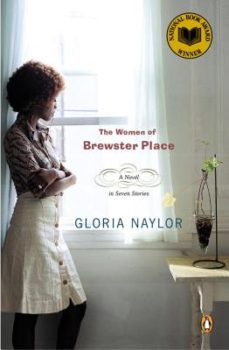 In reading your book, I kept being reminded of Gloria Naylor’s The Women of Brewster Place—a book about a similar urban locale and its citizens. Was Naylor’s novel hovering in your mind as you conceived and wrote Union Square? Or is there some other work or author that hovered around it?
In reading your book, I kept being reminded of Gloria Naylor’s The Women of Brewster Place—a book about a similar urban locale and its citizens. Was Naylor’s novel hovering in your mind as you conceived and wrote Union Square? Or is there some other work or author that hovered around it?
I do love that novel but can’t say it directly influenced Union Square. In this case, the locale, time, people, and flavor of the place are so deeply imbued in the way I look at the world, and one of the strongest motivations for writing this book, and one of the deepest concerns in getting it right, was to be true to what I remembered, which was much different from, say, Hairspray or Diner, which—when people consider mostly white Baltimore—is what they will think of or be nostalgic about. I am a repeat-reader, though, and I have to be very careful I haven’t let someone else’s words or characters slip in to mine.
One great influence, however, was Barry Levinson’s remarkable television series from the 1990s, Homicide: Life on the Street (I’ve never read the book that series is based on). That show represented one view of race in Baltimore that was to me exquisitely accurate, and was very helpful as a kind of anchor, even though the direct context of Union Square is still pretty different. One way to say this is that Union Square is meant to be a doorway into what follows, and in my mind, Homicide is part of what was found later on the other side of that door.
What does the geographical space of Union Square symbolize in the history of Baltimore? Was it “your” part of the city while you lived there? And more broadly, when did you know that you had to write a novel about the place, with intersecting storylines, instead of merely following the story of an individual?
Yes, I lived in this neighborhood off and on from the time I was a baby until I was about sixteen, when I moved away from the city altogether. This question is for me very important. One of the real obstacles I had in writing the book was my memory of day after day after day of simply not doing anything, which I saw as very typical of that neighborhood when I lived there. You went to work, to school, to the library, to the market, and you went to church. If you were a man (and sometimes if you were a woman), you went to the tavern. Sometimes you took a bus downtown, or a cab if you could afford to. My grandmother was close to a family who had a house “down the shore” on Rivera Beach on Chesapeake Bay, and we were invited there often in the summers. But that square—or, rather, sitting in the front window and looking up at it with longing—defined my view of the world. You didn’t go far, or alone, because it was not safe. We were not allowed to play on the front walk, because my grandmother didn’t want us mixing with the other kids whom she considered low-class.
I recently had the insight that we lived in poverty, but we were not allowed to “be” in poverty (maybe that’s the shanty Irish thing). So my sisters and I spent a lot of time just sitting around. Now, in a novel, of course, usually people have to do things, go places, things have to happen, which until I began to get feedback on early drafts of the book I had simply not considered! That was a real psychological barrier for me. So, most of the things that “happen” in this first book are sheer invention, in part a swan song of what I retrospectively imagine about what had been a very respectable neighborhood (which it really was no longer by the time I was conscious of it). What Catherine was able to do, for example, walking with only another girl over to Woolworth’s, I would never have been allowed to do on my own in that neighborhood, and rightly so.
Every work makes its own deal with autobiography, and clearly Baltimore is part of your life. What deal(s) did you make with autobiography with Union Square?
I made the deal that I was going to try to be as true as I could be to the geography, and that everything else was going to have as little of “what really happened” to me as possible. People who are very close to me will likely say, “I can’t believe she thought that!” or thought somebody said something, or thought such-and-such a place could be gotten to in the amount of time, etc. But there is really a very small handful of events that were drawn from my life, and even though some of the characters (Petie, most notably) are based on real people, for the most part that basis is very slight and mostly psychological, not physical or actual. The Baker children, for example, are very loosely based on a brother and sister whom I knew when I was in junior high school, and then only for a short while, maybe a few months. They were lovely people, whom I and my friends did not treat all that well, and they had a Newfoundland named Che.
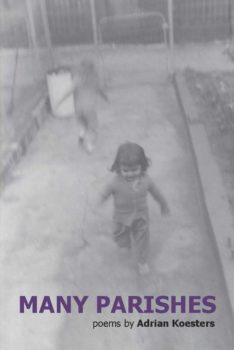 You’ve been a Midwesterner—specifically a Nebraskan—for decades now. Yet you’re writing about a dense urban environment on the east coast, which is about as far emotionally as you can get from the Great Plains, and on top of that you’re reaching all the way back to 1952. How does being in such a different environment than the one you’re writing about shape the ways you imagine Baltimore?
You’ve been a Midwesterner—specifically a Nebraskan—for decades now. Yet you’re writing about a dense urban environment on the east coast, which is about as far emotionally as you can get from the Great Plains, and on top of that you’re reaching all the way back to 1952. How does being in such a different environment than the one you’re writing about shape the ways you imagine Baltimore?
My growing up was very traumatic, which I think is easily inferred from some of the things that happen in the book. I visited Baltimore in the spring of 2017 to do a poetry reading through the kindness of Clarinda Harriss, publisher of my first poetry collection. Driving around the city, I really lost it at one point. It was very tough to go back, and that’s one quite sad thing in my life—I don’t think I could ever again spend any real length of time in Baltimore. I love Nebraska, though when I first came here to go to college it certainly felt like another planet. But the time in Nebraska has allowed me to return to the material without it being as harmful as it might have. I don’t view Nebraska as necessarily an innocent or safe place, but for me it has provided important psychological safety. Still, writing the book was not easy in that way. Again, it’s very important to me as a woman novelist that Union Square not be seen as thinly-veiled autobiography, which is a charge often levelled at women’s fiction in a way that it isn’t as much for men’s.
Speaking of hardship, in getting to know your characters I thought a lot about poverty. They’re enmeshed in an economic struggle to get by that we haven’t seen in America for a long time. The division between the haves and the have-nots in Union Square strikes me as similar to where we’re heading socio-culturally in the US right now. I’m curious to know if this played at all into your decision to pursue this novel, and what resonances you see between Baltimore in 1952 and today.
Absolutely, and that is a key question, thank you. When people started talking about “latchkey children,” in the 1980s or so, my first thought was, what are you talking about? Once we were in grade school living with my mother, we were always “latchkey” children and so were most of the kids we knew. Only if you were very well off or very poorly off did your mother not work, and the women in my family always worked because there were not as many men in the house at any given time. I didn’t know my biological father, but my step-grandfather died very young compared to today’s norm, and my grandmother, mother, and aunt all worked most of their lives.
But the larger question is that entrenched poverty. So, when you say “we haven’t seen that in America,” in my view that’s entirely dependent upon how the “we” are defined. Ta-Nehisi Coates talks about his part of Baltimore (he’s my junior by ten or fifteen years, I think) as if it were another planet from the world to be found just half a mile away, a planet that, even though I lived in it for a few years when my mother was holding down fairly good jobs, also always seemed to me as a place I would never belong to or understand. And as poor as we were, even as a child I didn’t, and knew I would never likely have to, live the poverty of most Black Baltimoreans.
The issue that speaks to your question is the fact that generational poverty is becoming more entrenched in more places, whereas in post-WWII America it seemed that this was going to be a turning point. For a lot of white people who looked forward to a new kind of middle class prosperity—The Man in the Grey Flannel Suit plays to this narrative, for example—that’s exactly what did happen. But for millions of urban Americans, especially people of color, that promise was not fulfilled. My sisters and I were lucky in that we got out due to the intervention of family members who were able and willing to help us. But if that had not happened, it’s not clear to me that I’d be alive to tell this story, much less to have written this book—and by far, our family was one of the better off, as near as I could tell.
You like to get into the heads of male characters, and although we end on Catherine, we spend a lot of time on men: the semi-indigent Mr. Emerson, the boxer Paddy, his rival Petie. It struck me as an almost male-centric book, which goes a bit against the expectations we have for female authors. How do you do it and why? Why was this perspective important to you and what was your writing process like with these characters?
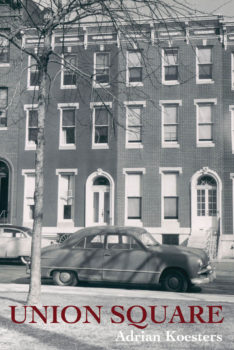 Well, I would have to disagree with you about this! I like to get into the heads of all characters to some degree or another, which I believe is essential to a well-written novel. I see Union Square as balanced and not at all “male-centric,” except of course to the extent that Western and American culture is by definition “male-centric,” as tough as it might be to acknowledge this. Catherine, her mother, Carmen, Miss Maurice, Bridget, and her mother are all very strong characters into whose heads I had to work just as hard to get right as the men, and what happens to them, although possibly not as overtly “dramatic,” is every bit as critical to the story—in some ways more so.
Well, I would have to disagree with you about this! I like to get into the heads of all characters to some degree or another, which I believe is essential to a well-written novel. I see Union Square as balanced and not at all “male-centric,” except of course to the extent that Western and American culture is by definition “male-centric,” as tough as it might be to acknowledge this. Catherine, her mother, Carmen, Miss Maurice, Bridget, and her mother are all very strong characters into whose heads I had to work just as hard to get right as the men, and what happens to them, although possibly not as overtly “dramatic,” is every bit as critical to the story—in some ways more so.
But more than one reader has been struck by how plausible the male characters seem, and I take that as a high compliment. Beyond this, when you have spent your early life having to understand what a man might be thinking (and I don’t think I’m unusual in this) and what he might be feeling, recreating that may come more easily to you. But, again, I worked very hard on all those characters and their voices, and found that when I treated each one as the person I saw her or him to be, the character let me know, in a sense, who she or he was and I could hear that character’s voice very distinctly.
I noticed in reading the book that you like to leave things unsaid—to use the negative space available to you and let the reader fill in. I’m thinking, among other things, of the circumstances around the death of Paddy Dolan’s father. I didn’t know on a logical level how things played out, but felt like I did on a visceral level. Is not spelling things out and leaving that kind of detail up to the reader important to you? Why?
Very important! I really feel that question. On the one hand, I have to be careful not to have too much negative space, because that’s a weakness in my drafts. Revision is almost always concentrated on just this issue—is it too much, or too little, or just right. Part of the “privacy” of Nevan Dolan’s death was to allow the other characters to react to it, Seamus in particular in his shameful feelings, and obviously as the terrible traumatic turning point for Paddy. But the other thing is that I rely on the intelligence of the reader to figure out what has happened without having to color-by-numbers or connect the dots. For myself, the great pleasure of reading is to be able to fill in and anticipate, and I want to provide that pleasure to my readers as well.
This is your first novel, after a couple books of poetry and one of nonfiction. How do you like the form, and what transferred over—work habits, tools of language—from the other genres? Where does fiction fit for you, and are you working on another fiction project now?
Union Square is the first of a trilogy, and I am currently working on the second book, set in 1964. After the third novel is done, I’ll likely disembark from Baltimore and concentrate on other places—now that I think about it, we didn’t really talk about “place” writing here so far, but probably I am more of a writer of place. I don’t really know what that means as far as how important it is to the book itself—it’s more of an academic category to my mind, rather than a meaningful one for literature—but I think that’s so.
I didn’t really know until I started my MFA at Pacific Lutheran University that there was such a thing as the multi-genre writer. When I was in college, there were these interminable conversations about writers who “tried” to write both poetry and fiction—D. H. Lawrence was always brought up as having “failed” because he tried to be “great” at both, and really, we don’t even have those conversations anymore. Still, most of us identify most writers with a single genre. Often people don’t remember that John Updike, for example, published several volumes of poetry and was one of our best essayists, and Louise Erdrich, whom I admire greatly, is both a poet and novelist, as well as a memoirist, and there are many other examples. For a long time it has been accepted truth that poetry and creative nonfiction go together naturally. I know poets who claim they can’t write a line of prose and fiction writers who don’t publish poetry. I do think that attending that program with so many multi-genre writers was one of the best strokes of good fortune I could have had.
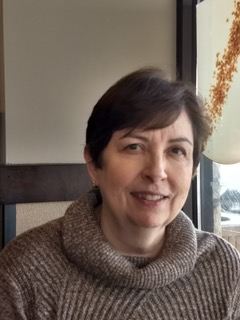 When I first discovered the novel form, I was convinced the best I’d be able to do would be to write a series of linked short stories to get the book up to novel length, but when I got going, it was a revelation. I loved it. The sheer freedom of having all that time and space to move in was the best writing feeling I’d ever had, and, well, I was sold. I didn’t know how much I would love writing dialogue, either, or that I’d be any good at writing physical detail. But if you focus on those things, I think they come to you. I likely bring the poetic appreciation for language to my prose work, but for me that is likely synthetic by this point.
When I first discovered the novel form, I was convinced the best I’d be able to do would be to write a series of linked short stories to get the book up to novel length, but when I got going, it was a revelation. I loved it. The sheer freedom of having all that time and space to move in was the best writing feeling I’d ever had, and, well, I was sold. I didn’t know how much I would love writing dialogue, either, or that I’d be any good at writing physical detail. But if you focus on those things, I think they come to you. I likely bring the poetic appreciation for language to my prose work, but for me that is likely synthetic by this point.
I think the main thing for any writer is that you have to enjoy what you’re doing—other anxieties aside—but that when you are writing, you ought to take pleasure in it. I can’t imagine any other reason for doing it. I’ll also admit that I’m a terrible short story writer, no kidding. I think of a contemporary masterpiece like Lauren Groff’s “Delicate Edible Birds” and know I could not write a story like that if my life depended on it. On the other hand, I also very much enjoy writing creative nonfiction, but nearly always as short prose. I’m not sure, but this issue of length and boundary may be the connection to poetry as well—it’s difficult to articulate but they do seem to work the same writing muscles, differently than long fiction. Honestly, I don’t quite know what to say about it. I’ve heard so many short story writers say, “Now I have to tackle the novel,” and I think, “Really? I don’t know how you write those incredible stories you do.”

